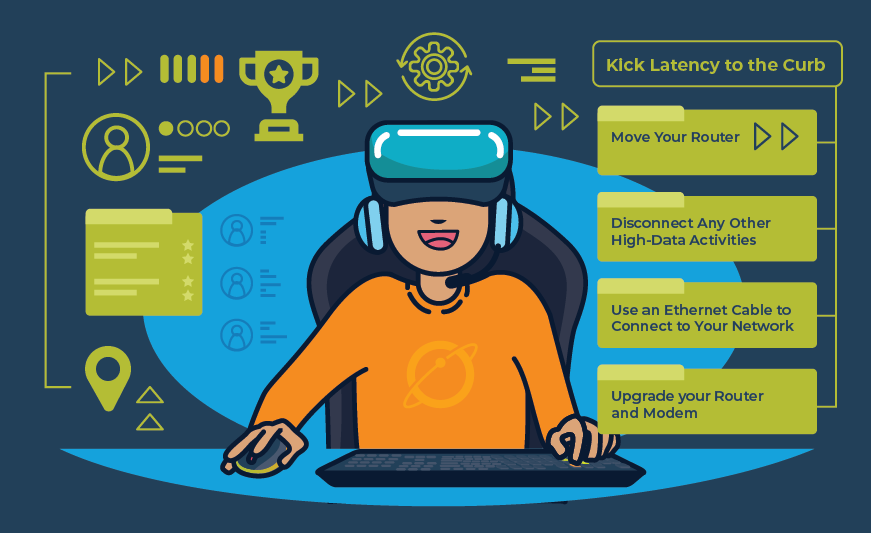How to Improve Internet Latency for Better Competitive Online Gaming
Summary: If you love online gaming — especially the competitive kind — you know that high internet latency can (quite literally) kill the vibe. It might be time for better high-speed internet. Or it might be as easy as moving where your router lives. Read on for our best tips so you can get back to winning.
If you’re into competitive gaming and esports, you know the difference that a slight delay can make. One or two seconds might not even be noticeable in games like Legend of Zelda or Animal Crossing. But if you’re in combat with another team on Call of Duty or World of Warcraft, those seconds can make a huge difference.
Sometimes finding a better fiber internet plan is the answer. But faster speeds aren’t always the answer. We’ve got the best tips on how to improve latency whenever you’re gaming. But first, let’s look at what latency is.
What is Latency?
While they’re often lumped together, there is a difference between bandwidth vs. latency. Bandwidth is the maximum amount of data that can be transferred at once and is comprised of your upload and download speed.
But latency is how long it takes for data to travel from Point A to Point B. You may have also heard it called ping time or lag, and it’s typically measured in milliseconds, or ms, especially on speed test results.
Lower latency is better, and average latency should be below 100 ms. The higher the latency, the more lag you’ll experience, which leads to delays between your action and your character’s action.
Now that you understand what latency is, let’s see how you can kick it to the curb.
Move Your Router
First, try moving closer to your router or making sure other objects aren’t blocking your signal. While it may not be the prettiest piece of equipment you own, you shouldn’t keep it in the closet. Walls, brick, certain appliances, and even a stack of books can affect your WiFi signal.
If there’s nothing blocking your router, can you move closer to it? If it’s kept in the front of your house, but you’re gaming in the back bedroom, it takes longer for the signal to get that far.
If neither of those is possible — or you’ve tried them both but nothing’s working — keep reading.
Disconnect Any Other High-Data Activities
Do you tend to stream Twitch on one screen while gaming on another? Or a family member is watching the latest episode of their favorite show in 4K at the same time? Simultaneous activities that require a lot of data (like streaming or gaming) can impact your gaming performance.
The same thing can happen if you have a lot of devices connected to the WiFi network. Try reducing the other activities you’re doing and disconnecting devices that aren’t in use. This will give your WiFi a chance to focus on one activity and should improve your speed and latency.
Use an Ethernet Cable to Connect to Your Network
It sounds old school but bear with us. Using an ethernet cable to hardwire into your router means you’re not relying on the WiFi. You should see drastic reductions in ping and might even see improvements in your speed.

Chances are that one of these cables came with your router or you’ve got one collecting dust in a drawer somewhere. Finally, keeping things “just in case” comes in handy!
If this still doesn’t work, it could mean that your equipment needs an upgrade.
Upgrade Your Router and Modem
If you’re using an old modem or router, that could be the issue. Old routers can affect connection strength, reliability, and speed. If you own your equipment, you’ll need to make sure you’re choosing a model that’s compatible with your internet service provider, internet speed, and even your usage.
But if you rent, you should be able to get in touch with your internet service provider online or in their app and request new equipment. That’s why when it comes to the renting vs. buying your router and modem debate, we tend to recommend renting.
Renting your hardware streamlines the troubleshooting and upgrade process, and you don’t have to worry about compatibility with a new internet plan every time you upgrade your connection or move.
If you’re ready to switch to an internet provider that makes it easy to find the right home internet plan for your life, offers budget billing, and speeds up to 5 Gigs, you’re ready for EarthLink. We’ve got plans that are perfect for the most elite gamers — and the casual ones, too. Find your fiber internet plan online today or give our Internet Experts a call at 8666180264.
